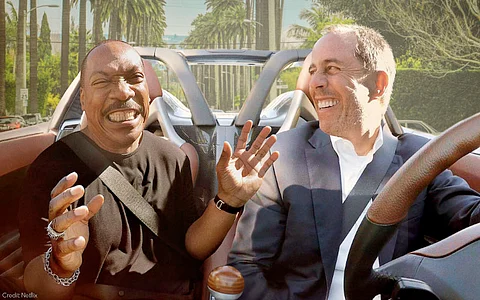
- In-Depth Stories
- Web Stories
- Reviews
- News
- FC Lists
- Interviews
- Features
- FC SpecialsFC Specials

Comedians in Cars Getting Coffee is a difficult series to place; it's too vague to function as a guide for aspiring comedians, yet more than just a vanity project for Jerry Seinfeld who spends a significant amount of time cruising down the streets of New York in an expensive car in each episode. In this anti-chat show chat show, Seinfeld drives to his guest's house, picks them up, and then drives to a cafe, bakery or restaurant where they drink coffee together as people around them stare and wave. In each episode, a car is specially chosen to reflect the guest's personality; Hasan Minhaj gets a sleek red Ferrari and Ellen Degeneres, a quirky jeep-like Toyota Land Cruiser. This novelty works well, opening a door into the minds of some of America's funniest comics, who engage in a loose, unstructured conversation about their comedic theories, successes, failures and their lives in general.
If you're a Seinfeld fan (of both, the person and the show) like I am, then you'll see that this show is just so authentic to who he is. No one else could have created a series that has nothing spectacularly appealing, yet so watchable. We've all seen his guests before – Stephen Colbert has shown us he's far from the character he plays on The Colbert Show and Kristen Wiig has already been through her extensive range of impressions. The luxurious cars are only exciting for an instant and the lengthy close-ups of coffee being made, which serve as transitions, don't do much else than temporarily remind you that coffee exists. There's extensive footage of Seinfeld and the guest simply walking around, randomly going into stores to sniff candles and test hand lotions.
Yet I watched, because as always, there was something engaging about Seinfeld's characteristic style of pointing out the absurdity of mundane situations – like how, before anything important, the digestive system relents control to the brain; yes, going to the toilet is important, but the task at hand, more so. His anecdotes about bombing at stand-up, marriage and kids guarantee chuckles.
Seinfeld hasn't mastered hosting because he is Seinfeld and he doesn't care to. In an episode with Sarah Silverman, he interrupts her while she's talking about her terrible depression to ask a waitress for half-and-half. "Of all the stories?" Silverman asks incredulously. He manages to secure his "dream guest" (former American President Barack Obama) only to interrupt him mid-sentence and talk more than he does. He has strong opinions on everything, from server etiquette and wheat milkshakes to life and death which he frequently spouts, quieting more reserved guests like Melissa Villasenor and Fred Armisen. This, despite an interview with Extratv in which he revealed that the show was for the comedians he loves to "investigate", rather than for himself.
The best episodes are the ones in which Seinfeld reconnects with old friends; Julia Louis-Dreyfus and Larry David especially. The star's softer side is revealed as he walks arm-in-arm with Dreyfus and convinces picky-eater David to taste his pancake. His tone is gentle and he laughs so hard he cries as they reminisce about the old sitcom days. You can feel the warmth even as the friends make inside jokes you weren't there for. With the likes of Dave Chapelle, Alec Baldwin, and Ricky Gervais, each foray into whether racist jokes are funny and how comedians are lazy god-like creatures is entertaining, provided you're interested in the comedian and have a general idea of what their act is about. Tina Fey, Jimmy Fallon, Trevor Noah, and Seth Meyers are not only genuinely likeable but also skilled enough to bounce off Seinfeld's sense of humour though it may be different from their own. Heart-to-hearts with Howard Stein and Michael Richards accomplish incredible honesty as the former reveals that behind his jovial radio persona he is a very anxious person and the latter confesses he's still haunted by the racist remarks he made more than 20 years ago that led to his expulsion from stand-up comedy.
However, bits with Hasan Minhaj, Amy Schumer, and Miranda Sings are so cringe-worthy that I skipped the episodes after a few minutes. Seinfeld repeatedly stresses that comedy is the one utopia in this world untouched by age, race, gender, or socioeconomic class, but the distinction is clear as he struggles to find common ground with Minhaj's millennial sense of humour, Shumer's body-image issues and Sings's eccentric Youtube persona. Seinfeld emphatically declares in an episode with David Letterman that "comedy is the closest thing to justice. If you're funny, you survive. If you're not, you don't" as if comedy really is this whole other world where no problems exist. The aggrandizement of the profession runs in many of the show's guests, creating in some cases, very passionate speakers, and in others, people who seem deluded. In the end, because this homage to comedy depends so much on the relationship between Seinfeld and the guest, this love letter to comedy ends up being more about Seinfeld and the good old times than it does about genuine talent and comedic method and practice.